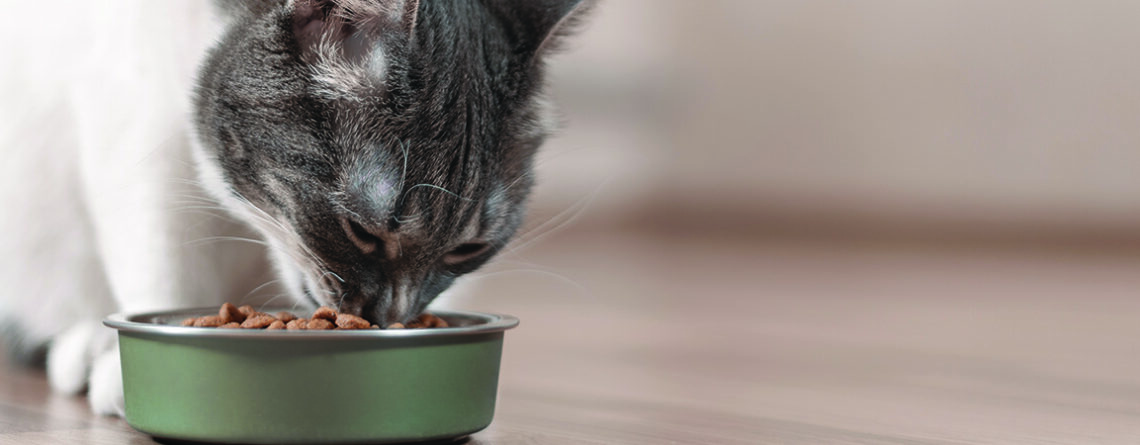Cat Nutrition: Everything You Need To Know
One of the best ways we can help our cats to accomplish health, wellness, and a happy life is through the nutrition we offer them. The food you feed your cat is the single most important thing you can do for their health, happiness and well-being, so understanding what their nutritional needs are is essential.
We’ve put together this page of resources and essential information to help guide you in the right direction and keep your cat healthy and happy throughout all the stages of their life.
Nutritional requirements of your cat
Cats are obligate carnivores, which means that it is essential their diet consists of nutrients that can be only found in animal products. Cats evolved as hunters that consume prey that contains high amounts of protein, moderate amounts of fat, and a small amount of carbohydrates, and their diet still requires these general proportions today. Cats also require many other nutrients, such as vitamins, minerals, fatty acids, and amino acids.
Protein
Protein is an essential nutrient in your cat’s diet, which helps the function of body tissues (like muscle), forms the basis for enzymes (substances needed for body function) and also helps prevent disease.
To ensure your cat gets all the best out of their diet, we recommend feeding foods that source high quality meat.

What can we recommend?
WELLNESS CORE Cat Tender Cuts Chicken are complete and balanced meals with a range of protein-rich recipes to keep mealtime tasty and tender, savoury, saucy and fresh to please even the most finicky of eaters. We also recommend Seven Adult Cat Chicken & Rice, which is a great source of quality protein, rich in essential amino acids including Taurine and Vitamin A to help support the heart and vision, along with Omega-3 which promotes good coat and skin condition.

Fats
Fat is a vital element of the functioning of our cat’s body. It forms part of the membrane or outer coating of every cell in the body, it coats nerve cells and helps them transmit electrical signals more efficiently, and it is essential for the formation of hormones. Vitamins such as A, D, E and K, require fat for their absorption, and sufficient dietary fat is essential for a healthy coat and skin.
Depending on age and activity level, a cat’s diet should typically consist of 25-30% fat. Some groups of cats, such as young cats, pregnant and/or lactating queens, can benefit from even higher levels, as they require extra energy for growth. Essential fatty acids are required in the diet as cats cannot produce them by themselves.
Fat is very much an essential nutrient for our felines, and optimising fat levels in their diet can help their longevity.
What can we recommend?
VetIQ Healthy Bites Urinary Care for Cats 65g comprise of a crispy cereal shell with a health enhancing cream filled centre packed with amino acids, vitamins, antioxidants, essential fatty acids and plant extracts to help support a healthy urinary tract and immune system.
Carbohydrates
Carbohydrates should only make up around 10% of your cat’s diet but this does not mean they are less important. Your cat will benefit from foods containing nutrient-rich complex carbohydrates. These carbohydrates also provide a source of vitamins, minerals, antioxidants, and fiber. Antioxidants can help with the prevention of illness, and high fiber carbohydrates take longer to digest which helps prevent a spike in glucose.
It is recommended you feed your cat a low-carbohydrate diet with between 10% to 15% of the calorie content from carbs is considered the bare minimum — which is about what they’d consume in the wild. Ideally, no more than 30% of the calories should come from carbs when feeding your cat.
Vitamins & Minerals
There are certain vitamins and minerals that are essential to your cat’s diet. Vitamins and minerals occur naturally in foods such as meat, vegetables, and fruits. They help their vision, bone growth and metabolism; almost every part of your cat’s body needs vitamins for one reason or another. Although vitamins and minerals equate to less than 10% of your cat’s diet, meeting these levels is virtually impossible without additional supplementation.
What can we recommend?
High in Omega-3, OMEGLO Skin Function Support helps support skin function and of the metabolism of joints. OMEGLO is a complementary dietetic feed for dogs and cats, for the support of skin function in the case of dermatosis and excessive loss of hair. It also helps aid the metabolism of joints in the case of osteoarthritis.
Weight & Body Condition
The Body Condition Score is an international scale, widely used to assess whether or not your cat is under weight, over weight, or at an ideal level. Monitoring your cat’s weight and body condition score will help you to track their growth and development and guide you in knowing if / when a change in food or activity is required.
Monthly weight checks are recommended for your kitten while they are growing, after which your adult cat should have a weight check at least once every three months.
By regularly monitoring your cat’s weight you can quickly identify if there is any cause for concern, and allow you to take early action to prevent weight related problems from developing.


